Weight loss is always a hot topic, attracting the attention of many who wish to improve their health and physique. In the journey of weight loss, food selection is the topmost important factor. One of the dishes that many people love but still causes much debate is sushi. Some people believe that sushi is the perfect choice for a diet due to the excellent combination of fresh fish, vegetables, and rice. However, there are also opposing views that eating sushi could affect weight loss goals. So, is sushi good for weight loss? Let’s explore deeper with Grove Health Bondi about the nutritional components in sushi, the benefits and limitations of this dish, thereby helping you make smart and correct choices in your weight loss menu.
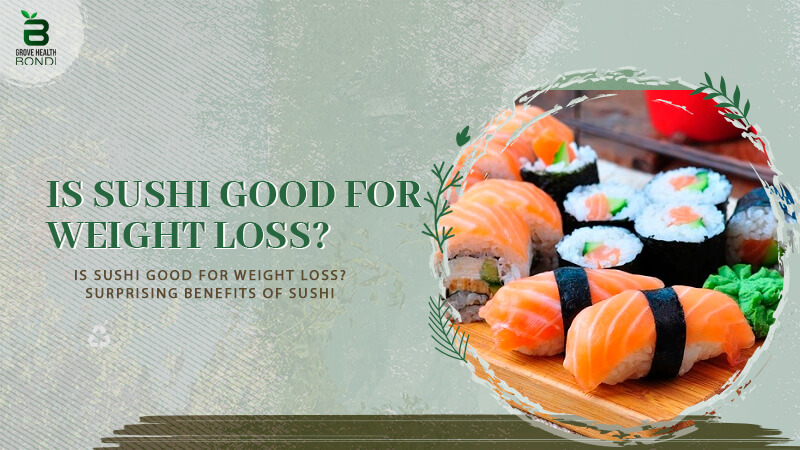
1. What is Sushi?
Sushi is one of the most famous traditional dishes of Japan, known and loved worldwide. The essence of sushi lies in the rice mixed with sushi vinegar, creating a distinctive flavor, served with various ingredients such as raw fish or seafood, vegetables, and sometimes eggs or meat. These ingredients can be rolled with seaweed (nori) to form maki, placed on a small ball of rice to create nigiri, or even prepared as sashimi, a dish where raw fish is thinly sliced and eaten without rice.
Sushi is not just a dish, it’s also a form of culinary art, requiring skill, precision, and experience in preparation. This makes sushi highly appreciated not only for its taste but also for its aesthetics. The diversity in preparation methods and ingredients used makes sushi suitable for various tastes, from those who like the traditional flavors of Japan to those who like experimenting with new and unique flavors.
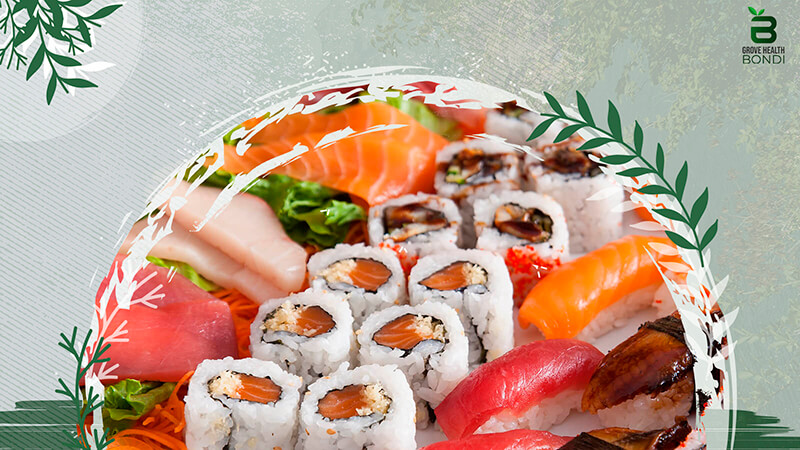
2. Nutritional Components of Sushi
Sushi is a nutrient-rich dish, low in calories and packed with protein, omega-3 fatty acids, and antioxidants. Let’s delve into the main components of sushi to better understand the nutritional value it offers:
- Rice: Sushi rice is rich in carbohydrates, providing essential energy for the body. Typically, this rice is seasoned with sugar and rice vinegar, which can increase the calorie content.
- Fish and Seafood: The seafood in sushi is a plentiful source of protein, supplying essential amino acids necessary for building and repairing body tissues. Fish is also one of the few natural foods containing vitamin D and omega-3 fatty acids, essential for optimal brain and body function.
- Vegetables: The vegetables used in sushi provide many important vitamins and minerals, contributing to a more balanced and healthier meal.
- Seaweed (Nori): Nori, the seaweed used to roll sushi, contains numerous nutrients such as calcium, magnesium, phosphorus, iron, sodium, iodine, thiamin, and vitamins A, C, and E. Nori also has a high protein content, equivalent to protein-rich plant foods like soybeans.
- Wasabi: Wasabi, often served with sushi, is made from the stem of the Eutrema japonicum plant. Wasabi contains beta carotene, glucosinolates, and isothiocyanates, known for their antibacterial, anti-inflammatory, and anticancer properties.
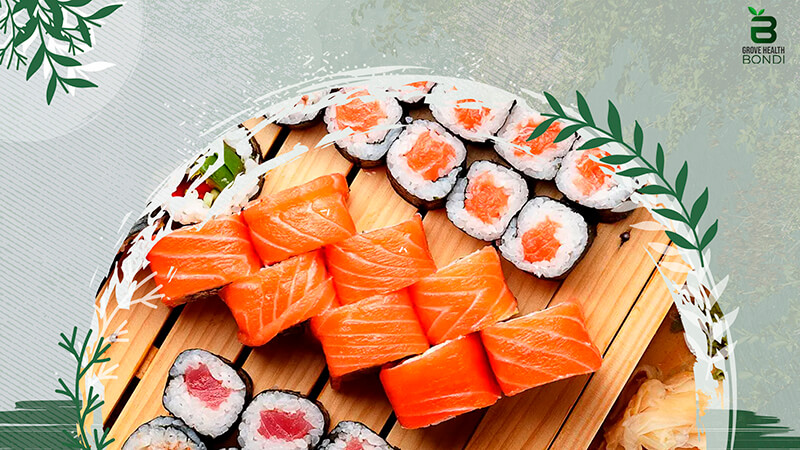
3. Health Benefits of Eating Sushi
Sushi is not just a delicious dish, but it also offers numerous health benefits. Here are some of the main health benefits of eating sushi:
3.1 Rich in Omega-3
Fatty fish such as salmon, mackerel, tuna, and yellowtail used in sushi are rich sources of omega-3 fatty acids. Omega-3 is crucial for cardiovascular health, helping to reduce the risk of heart disease, stroke, and high blood pressure.
3.2 Low Calorie Content
Typically, sushi is a low-calorie meal, especially when you choose lean fish and avoid high-fat items like tempura or mayonnaise sauce. This supports weight management and maintaining an ideal weight.
3.3 Quality Protein Source
Fish is a high-quality protein source, necessary for building and repairing body tissues. This also helps you feel full and satisfied after a meal.
3.4 Abundant in Vitamins and Minerals
Fish and seaweed, common ingredients in sushi, provide many vitamins and minerals such as vitamin D, vitamin B12, iron, iodine, and selenium, essential for overall health and well-being.
3.5 Good for Brain Health
The omega-3 fatty acids in fish help protect brain health, reducing the risk of cognitive decline, memory loss, and Alzheimer’s disease.
3.6 Anti-Inflammatory Properties
Some ingredients in sushi like ginger and seaweed have anti-inflammatory properties, helping to reduce inflammation in the body and prevent some chronic diseases.
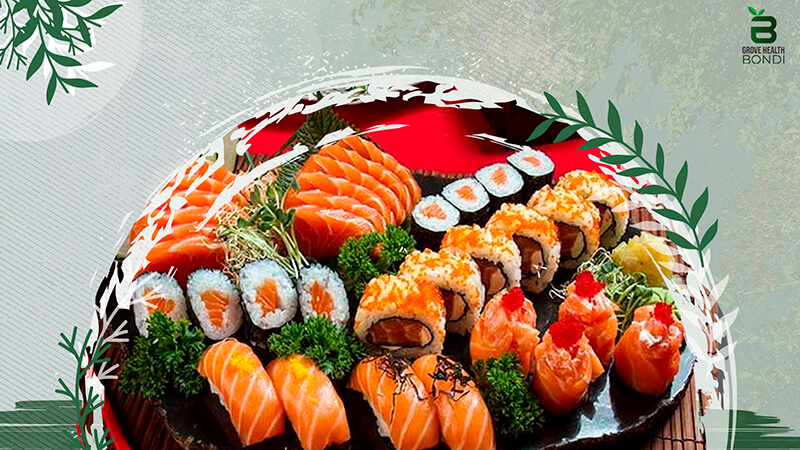
4. Limitations of Eating Sushi
While sushi offers many health benefits, it’s also important to be aware of some potential drawbacks to better protect your health:
4.1 Risk of Foodborne Illness
Sushi often contains raw fish, which could increase the risk of foodborne diseases. This is especially important if the preparation area or ingredients are not sanitary.
4.2 Increased Refined Carbs
Sushi is typically made from white rice, a type of refined carbohydrate. A short bowl of rice can contain up to 53 grams of carbohydrates, contributing significantly to your daily calorie intake.
4.3 High Sodium Content
Many ingredients in sushi, even before adding soy sauce, can contain high levels of sodium. Consuming too much sodium may not be good for overall health, especially for those with blood pressure issues.
4.4 Risk of Mercury Contamination
Some types of fish used in sushi, such as king mackerel, can contain high levels of mercury. Consuming too much mercury can cause health problems, especially issues related to the nervous system.
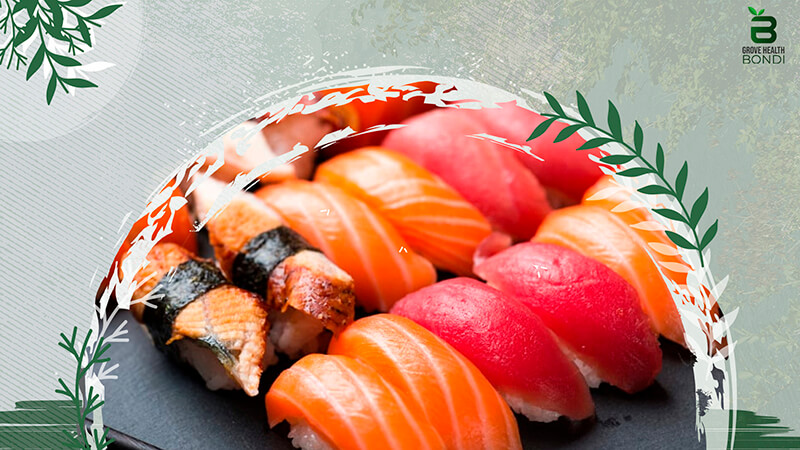
5. Caloric Content in Sushi
Sushi offers a wide range of nutritional choices. Here is some information about the calorie and nutritional content of some popular types of sushi:
California Roll
The California Roll is typically made from cucumber, avocado, and cooked imitation crab, all wrapped in nori seaweed. Two to three pieces (about 100 grams) of this sushi provide:
- Calories: 93
- Protein: 2.9 grams
- Carbs: 18.4 grams
- Fat: 0.7 grams
- Sodium: 428 mg
Spicy Tuna Roll
This roll consists of white rice with vinegar, avocado, cucumber, sesame seeds, and chili sauce, containing raw tuna. Two to three pieces (about 100 grams) contain:
- Calories: 175
- Protein: 7.5 grams
- Carbs: 16.7 grams
- Fat: 7.5 grams
- Sodium: 217 mg
Spicy Salmon Roll
Similar to the spicy tuna roll but instead it contains salmon. Two to three pieces (about 100 grams) contain:
- Calories: 190
- Protein: 6 grams
- Carbs: 24 grams
- Fat: 6 grams
- Sodium: 330 mg
Tempura Shrimp Roll
This roll has shrimp dipped in flour, egg, and breadcrumbs, then fried, served with tempura sauce. Two to three pieces (about 100 grams) contain:
- Calories: 175
- Protein: 3.7 grams
- Carbs: 28 grams
- Fat: 5.9 grams
- Sodium: 421 mg
Avocado Roll
This is a vegetarian sushi made from avocado, pickled ginger, sesame seeds, and wasabi, wrapped in seaweed.
By knowing the calorie content and nutritional composition of different types of sushi, you can make smarter choices for your meals. This helps maintain a healthy and balanced diet.
6. Is sushi Good for Weight Loss?
Yes, Sushi can be a supportive in weight loss. With its relatively low calorie content, sushi is suitable for those aiming to lose weight. The ingredients of sushi typically include nutrient-rich components such as fish, vegetables, seaweed, and rice, providing a good balance of macronutrients – proteins, carbohydrates, and fats.
A traditional piece of maki roll sushi only provides between 20 to 28 calories. However, it’s important to pay attention to the types of sauces and toppings as they can increase the calorie content. Limiting tempura-fried sushi types can also help maintain a stable calorie intake. Remember, weight loss only occurs when the body is in a calorie deficit state, meaning the calories consumed through food and drink must be less than the calories burned throughout the day.
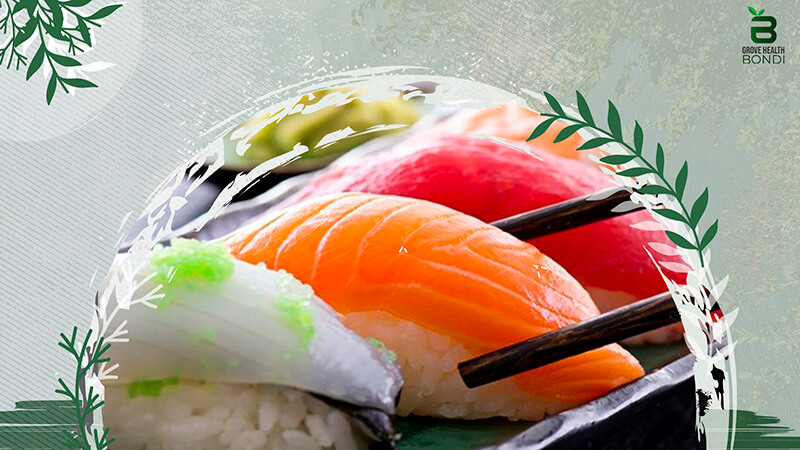
7. Optimal Time to Eat Sushi for Effective Weight Loss
For effective weight loss, the timing of your sushi meal is of great importance. It’s advisable to have your sushi dinner earlier— ideally two to three hours before you go to sleep. This gives your body sufficient time to digest the food and also minimizes the risk of late-night snacking. As per a study, individuals who have successfully shed weight usually have their dinner between 7:00 and 7:30 PM.
8. Effective Ways to Eat Sushi for Weight Loss
To enjoy sushi while maintaining weight loss, you can follow these tips:
- Avoid fried rolls: Skip rolls that are deep-fried or have “tempura” in their name.
- Prioritize fresh vegetables and fish: Choose sushi rolls that mainly consist of fresh vegetables or fish.
- Avoid mayonnaise and cream cheese: Opt for rolls without mayonnaise or cream cheese to reduce calorie intake.
- Use soy sauce sparingly: Use soy sauce in moderation or choose a low-sodium version.
- Opt for brown rice: Instead of white rice, choose brown rice to increase fiber intake.
- Tuna or salmon nigiri: Nigiri consists of a small mound of rice topped with a slice of raw fish. Tuna and salmon nigiri are excellent choices with low calories and high omega-3 content.
- Sashimi: Sashimi is thinly sliced raw fish, usually served with soy sauce and wasabi. It’s an ideal choice as it is high in protein and low in carbohydrates.
- Vegetarian rolls: If you prefer vegetarian options, choose rolls made from cucumber, avocado, and carrots. These are low in calories and high in fiber.
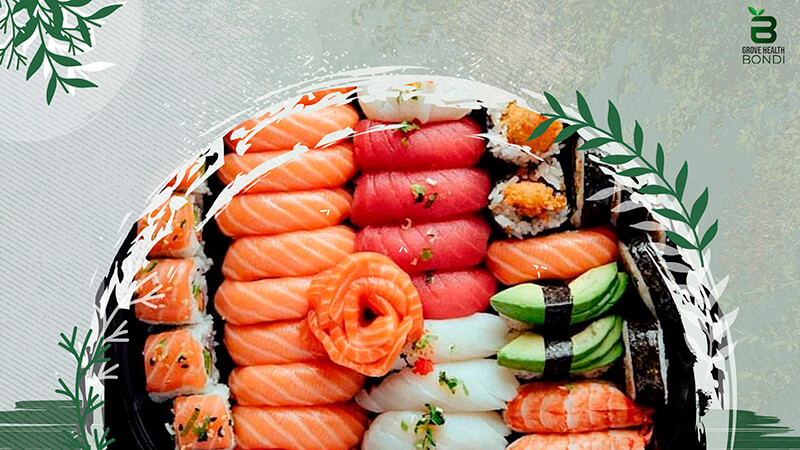
9. Conclusion
In the journey of weight loss, food selection is a crucial factor determining success. Sushi, with its unique combination of omega-3 rich fresh fish and plant-based ingredients like seaweed and vegetables, not only provides health benefits but also supports weight loss. However, it is essential to choose low-calorie sushi options like sashimi and nigiri while avoiding rolls with lots of mayonnaise or high-calorie sauces. So, is sushi good for weight loss? The answer is yes, if you make sensible choices and eat in moderation. Incorporate sushi into a balanced and nutritious diet to achieve your desired body shape quickly and sustainably.

